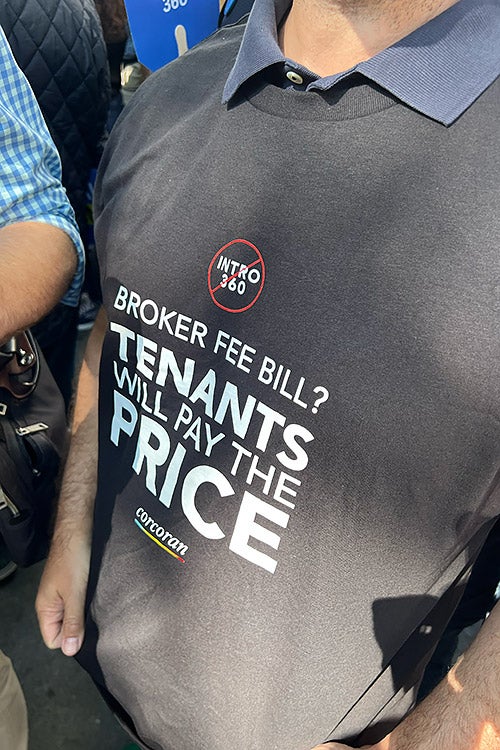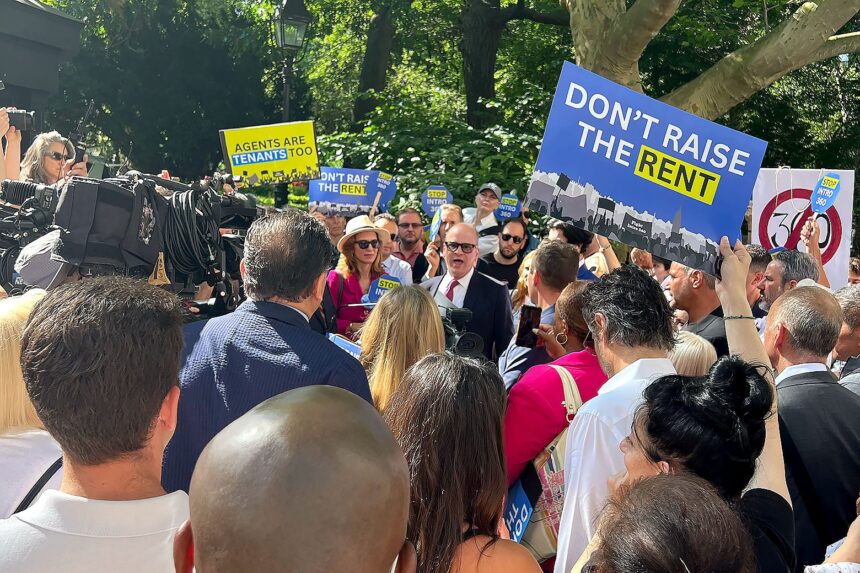Hundreds of real estate brokers were spilling off the sidewalk and into the street around New York City Hall. “There will be more,” broker Graig Linn assured me, venti iced Starbucks coffee in hand. “It’s 9 a.m. That’s tough for brokers.”
Even that early, all the big real estate agencies were represented. Sotheby’s brokers were there in matching shirts. Douglas Elliman brokers were there in matching shirts. Bond brokers were there in matching hats. Corcoran brokers were there in matching hats and matching shirts. Everyone in attendance was gathered to object to a New York City Council bill that would save tenants from having to pay fees to real estate brokers who were hired by landlords—i.e., brokers that tenants did not hire. In other words, it was a rally for keeping the fees on the backs of tenants.
New York City is one of only two cities in America that allow this practice, and during a time of skyrocketing housing costs, it has become an increasingly loathed, hard-to-explain payment—one that usually falls between 10 to 15 percent of the annual lease amount to the broker who shows the apartment. For example, if you rent a two-bedroom apartment in Brooklyn for $3,800 a month, you can expect to pay a $7,000 fee to someone who maybe only let you in to see the place and then handed you a lease to sign. The New York City Council bill, called Intro 360 and spearheaded by Bedford–Stuyvesant Councilman Chi Ossé, would force landlords, not tenants, to pay the brokers those landlords hire.
This has infuriated brokers—who, not incidentally, share a muscled-up lobbying group with landlords.
The Real Estate Board of New York and the New York State Association of Realtors issued a call to arms, and the industry folk came in crowds, young and handsome and coiffed, wearing their fair share of gingham. There were lots of high heels for a street protest, and suspiciously few forehead wrinkles. There were signs. “This bill will kill my livelihood!” read one, the lettering in all caps. “Agents are tenants too,” read another.
They wore threatening apparel: “Broker fee bill? Tenants will pay the price,” warned one T-shirt, underwritten by the Corcoran logo. They chanted: “Hey hey, ho ho, Intro 360 has got to go.” They also chanted the word no, a lot. “Landlords cannot pay fees. It’s not in their budgets and they won’t do it,” yelled one speaker-broker, sans microphone, to the crowd. “No!” the crowd yelled back. “No! No!” A truck honked—did he know he was honking for broker fees?—and everyone cheered. There was much talk of “unfairness.”
It’s a spring and summer of protest in New York. And yet brokers and real estate agents are among the last people you’d expect to see taking to the streets. Usually they don’t need to. That’s what the lobbyists are for.
Rents in America hit an all-time record last summer, and they are on the rise again. The cost to buy a house is also at record highs. There are many reasons for this, depending on whom you ask, including lack of supply, lack of regulation, the free market, corporate conspiracy, but also the very formidable real estate industry and its very formidable lobbying groups of landlords, brokers, and real estate agents.
For now, the Biden administration has identified “junk fees” as a foremost enemy in its war on rising living costs for consumers across the country. That means brokers, who had been having a pretty good go of it, are feeling the heat. A federal jury recently found the National Association of Realtors to be engaged in collusion to artificially inflate real estate fees, awarding a nearly $2 billion judgment. A settlement announced in March will end the customary 6 percent take for Realtors; it has been the case that agents representing the buyer and the seller split and pocket 6 percent of the total sale price of a house. That’s six times higher than the average in the United Kingdom. In April, the Justice Department got clearance to further investigate the NAR’s alleged anticompetitive behavior.
In New York City, where renters abound, the broker fee bill is just one vote away from a veto-proof majority, according to the New York Times. Without that vote, it’s possible that Mayor Eric Adams—who was once a real estate agent, spoke at the REBNY lobby’s 2024 gala, and has helped himself to a troubling amount of real estate sector donations—will veto the bill.
If it passes, it will be hard-won. Intro 360 is far from the city’s first attempt to rein in this practice. But the real estate lobbies in New York City are very powerful, and the Real Estate Board of New York, the industry’s main lobbying arm, fiercely opposes the bill. The group successfully sued to overturn a 2020 New York Department of State guidance that prohibited brokers hired by landlords from charging tenants, a pre-pandemic flashpoint met with euphoria by many New Yorkers. A 2019 bill to cap broker fees at one month of rent died of lobbying causes—or at least of lobbying-induced comorbidities—in committee. With all their political power, brokers are rarely driven to public demonstration.
“It’s the first time I’ve ever come to City Hall and protested anything—what’s up, brother,” said Jonathan Tager, a broker for Corcoran, as he fist-bumped a colleague over my shoulder. “We cleared our whole days to be here.” When I asked him where he got the matching hat and menacing shirt, he told me their office manager was there handing them out.
“If this passes, we won’t be able to afford to live in our own communities,” said David Kafko, also from Corcoran.
According to Glassdoor, the average annual salary of real estate broker/owners in the United States is $276,000. New York is among the top five states for broker pay. And per StreetEasy, the average upfront cost to move into a rental in New York City in 2023 (broker fee included) was $10,454, up nearly a third since 2019. To reiterate: That’s an upfront cost—the amount of money that must be handed over before a tenant can even move in to an apartment.
Stories of outrageous broker fees in this city proliferate. One recent horror story involved a tenant who was asked to pay a $15,000 broker fee on an $1,100-a-month rent-stabilized apartment.

This is why some would say that all a broker does is unlock the door, if that—especially when the demand for apartments is so high. Some would also say that in the internet age, with listings right there on Zillow or StreetEasy, brokers are unnecessary, parasitic, due for a reckoning.
That was not the message at City Hall. The protesters contended that getting rid of this particular form of broker fees would merely result in equivalent rent increases. “I’ve been here fighting for reproductive rights,” yelled one broker, “but I never thought I would stand here today to demand the City Council stop the highest rent increase in history!” “No!” yelled someone else. I asked multiple attendees if, given the concern for high rents, they had attended or organized any other protests for affordable housing. I was told to reach out to the brokerage firms, or REBNY, the lobbying group, for better and more accurate answers on that particular question.
As part of the protest, brokers queued up down the block, waiting to be admitted, six at a time, to City Hall to testify at a hearing about the bill. “Rents are going to be higher,” Tager told me while he waited near the line.
There was some reason to doubt the argument. The trend lines might be muddled by COVID, but when New York state briefly outlawed the payment of broker fees by tenants in February 2020, New York City rents actually went down. That ban was overturned in court by a successful REBNY legal challenge in May 2021, which also happened to be the moment rents started to begin their rapid ascent again, per the city comptroller’s data. Perhaps that’s why, when I asked for evidence, I was hearing less about data and more about “the market”: If landlords were forced to pay broker fees, everyone around me kept arguing, those broker fees would just get baked into the rent. That’s economics, they said. “The free market works,” Kafko quipped.
I withdrew to a bench in the shade. I talked to broker Mark Danich of Bond. “We don’t just open the door. There’s a heck of a lot of work behind it,” he said. There are also no-fee rentals in the city, he reminded me—lots of them.
On the other side of City Hall, there were counterprotesters in similar formation, who were there in support of the bill. They were also queueing up down the sidewalk to get into City Hall to testify.
Danich was joined by three women, former co-workers. “I was surprised, yeah, by how many people there were over there,” he said, of the protests on the opposing side.
“Most of the people there are paid; they’re being paid to be there,” one of his colleagues assured me. “Just like with congestion pricing.”
I turned to look over my shoulder to see if I could spot any alleged paid protesters, skeptical that one would have to pay New Yorkers to dislike being charged thousands of dollars for a service they didn’t want or need or hire for. I turned back around to see Danich and the three women bringing it in. “Let’s do it,” Danich said, “Let’s do it.” He stretched out his arms, and all four embraced in a group hug.











